- Home
- Annie Jones
Mom Over Miami Page 16
Mom Over Miami Read online
Page 16
Reader mail day was often the highlight of Hannah’s week. She snuggled down deeper into the cozy cushions of the still-new couch and opened the first letter and then the next and the next. Two notes of encouragement and a high school student doing a project who wondered if Hannah might answer some questions on how she got started.
“I don’t think her teacher will like my answer to that much, will she, Tessa? How did you get started in journalism? Answer—against my will.” Hannah tucked the pages back inside the proper envelopes and set them aside to answer later.
“This one looks official.” She held up the only legal-size envelope in the bunch and tried to remember where she had seen the logo before.
“‘The Faith-Filled Home,’” she read from the letterhead inside. “Oh, yeah. I’ve seen their magazine in the church office.”
A subscription sales pitch probably. She read on. “Not that I have time to read for pleasure these—”
Not an offer to read, an offer to write. “We have read the columns in your local paper with interest, and would be open to future submissions of new material for possible use in our magazine.”
Hannah showed the paper to her daughter, careful to keep it just out of reach of those sticky fingers. “My editor at the paper is a friend of the editor of the magazine and sent some of my stuff over, and looks like they are ‘open’ to me submitting to them. I wonder what that means in editor-ese?”
Tessa rolled off Hannah’s lap and onto the couch, crawled to the back and started to pull herself up.
“Open? As in ‘We get so much of this stuff, another few won’t matter’? Or ‘open,’ as in ‘I saw something of worth in this stuff and wouldn’t mind seeing what more you can do’?”
The baby bounced at the knees a few times, clutching the back of the couch, like a rock climber about to make her ascent.
“The second. Definitely the second. I mean, if I have to choose…I choose the second option. Your daddy says for me to listen to the way I talk about myself, and he’s right. I am saying here and now that I can do this. I can produce something worthy of national publication.”
Her heart rate did a dance. Her throat went dry. “Listen to me! Did you hear that? I actually admitted I could do this.”
If…
Her eye fell on the single, pulse-stopping word on the page in her hand.
She drew a deep breath and made herself go silently over the proviso. “Needs polish…writing lacks focus…humor not enough to interest our readers…used as teaching tool…draw some pertinent spiritual lessons from your essays on daily life for our readers.”
Tessa sank slowly to sit on the couch. She grabbed the teething ring from Hannah’s lap and her mouth worked furiously on it for a few seconds before she batted the thing away.
Hannah held her breath, willing the child not to yowl out her frustration. “I won’t if you won’t.”
Tessa stretched, poked one tiny fist into the air, found a comfy position and relaxed into a chubby little ball in the crevice of couch cushions.
Hannah could not let go of her discomfort so easily. Probably, she reasoned, because it sprang from the deep, dark truth she knew about herself.
As a writer, she stank.
Or was that stunk? See? She didn’t even know the right word for sure.
The paper crackled in her hand.
“Still.” She chewed her lower lip. If she wanted to become a better writer, she needed experience and guidance. If she did accept the offer to try her hand at freelancing for a national magazine, she’d get both.
“Imagine that, sweetie.” She kissed her baby’s forehead. “Mommy has a chance to not stink. Do you suppose that’s possible?”
She kissed the child again, took a tiny sniff to make sure Tessa could make that same bold “not stinking” claim, then paper-clipped the offer to her check so she could consider it in depth later.
“Okay, one last reader letter, then I have to get with it. I still have to try to get a hold of your daddy and make plans for pizza tonight.”
She lifted the final envelope. It was pale blue and squarish, like it might contain one of those artsy cards with a postage-stamp-size black-and-white photo in the center. The kind of thing someone would go to a card shop and comb through the displays to find just the right one.
Hannah smiled at the thought of anyone going to such trouble for her. In fact, she still marveled that people took the time and effort to write her at all. She found it sweet and humbling and a little bit exhilarating all at once.
Letters—in a day and age when people just didn’t take the time and trouble. She flipped the blue envelope over to see if she recognized the name on the return address, but there was none.
“Hmm.” She slid her finger under the flap. “Ouch!”
Instinctively she shook her hand until the tiny sting subsided. She glanced at the inside of her knuckle, then heavenward with a smile. “Is this is your way of making sure I stay humble while reading fan mail, Lord?”
She laughed, not because she found any great wit in herself but because she felt a great contentment. Her children were healthy. Her son was making important strides in his spiritual growth. By her work and talent she had brought in enough money to provide her family with a special treat, and somebody thought she had the potential to be a decent writer.
She ripped open the blue flap and pulled free the delicate floral-covered notecard. “Let’s see what this nice, faithful reader has to say, shall we, Tessa?”
“Dear Mrs. Bartellet,” it began.
“Oops, misspelled my name. Guess she’s not that faithful of a reader after all.”
Hannah squinted at the cramped handwriting scaled down to fill every centimeter of white space on the inside of the card and her breathing went still.
17
Subject: Venting and reinventing
To: ItsmeSadie, WeednReap
Dear Sadie and April,
If I add I’m praying for you at the end of a response to criticism does that make it all right to be snarky? For example:
Dear Reader,
Thank you for your letter, and for taking the time from your obviously busy schedule of kicking puppies and shoving little old ladies into oncoming traffic, to share with me the many reasons why you think I am as ill suited to be a foster mom as I am unfit to be a writer. You present so many thought-provoking opinions. For instance, the thoughts they provoked in me were: You don’t know me or my family or what you are talking about when you presume to pass judgment on us. You are probably just a big miserable meanie with way too much time on your hands because you don’t have any friends or family of your own. Oh, and your penmanship is the pits. God Bless.
Or:
Dear Reader,
I noted from the misspelling of my name on the card that you were looking for a Mrs. Bartellet. As my last name is Bartlett I can understand the confusion and why your concerned letter was mistakenly forwarded to me. Am returning it with best regards and faith that you will in time find the object of your dissatisfaction.
Or:
Dear Reader,
Thank you for your frank and forceful letter wherein you called my work intellectual garbage and referred to me as a glib-talking airhead who has only made one valid point in her entire writing career—that her readers should all be praying for the welfare of her children.
As I sit here rereading your thoughts again and again, I cannot escape the reality. It’s true. All true. You have given voice to the suspicions I have long harbored but would never let myself fully embrace. I am no writer. I came to the craft much as I did foster parenting—by default. I once foolishly thought that maybe God had guided me into these things for His higher reasons.
I wonder if I had convinced myself of that because I so longed to hope, just a little, that I was worthy. That someone wanted me. But now…
Of course I’ll only send these to you and thank you and thank the Lord for your understanding and prayers.
Love,
Hannah
“You’re not eating your pizza.” Payt pushed the stark white plate toward her. “Your idea, you know, to come here and celebrate your big payday.”
“Celebrate?” She lifted the crust and let it drop. “I don’t feel like celebrating anything anymore.”
“Over a letter? One lousy, almost unreadable letter?”
“I could read it.” Every word.
He reached across the table to help himself to her slice. “Yeah, well, I wish you hadn’t.”
“Me, too.” She spoke in a small voice. It fit. She felt small. Insignificant.
“Ask ’em. Ask ’em.” The boys returned from the game room. The friend Sam had asked along for pizza nudged him in the shoulder. “Go on, ask.”
Payt leaned close to Sam. “I think your friend…Stilton?”
“Hunter,” Hannah hurried to correct, giving the boys a what-can-you-do?-the-man-never-listens eye roll for good measure. “I can’t believe you got that wrong.”
She couldn’t. Not after she had rattled on and on gushing her gratitude that Sam had picked Hunter over Stilton. About how she felt crummy enough this evening without the offspring of the world’s greatest mom sitting at the table telling her his mom made pizza at home, without cheese on account of his lactose intolerance.
“Bet she brews her own root beer, too,” Hannah muttered.
“Hmm?” Payt’s brow crimped downward.
“Nothing. I was just…” Acting petty. Normal. Small and petty. “It was nothing. I think Hunter wants to ask us something.”
Sam held his hands up in the universal language of kids that says “Don’t ask me why” as he said, “He wants to hear your talk.”
“My talk?” Payt frowned, a big phony, perplexedlike frown. He really hammed it up. Scratching his head and pulling on his ear like he couldn’t believe what he’d heard. “Would you like to attend a lecture on pediatric endocrinology, young man?”
The dark-haired child about to explode into a shower of giggles at the end of the table let out a long, loud “No-o-o-o.”
“Well, maybe I misunderstood you then. You say you want to hear my sock?” He raised his leg and tugged at the red socks he wore to work to amuse the children. “People have told me they were loud, but I don’t think you can actually hear them.”
“No-o-o-o,” Hunter managed to eke out between giggles.
Giggles. Not little, sweet, endearing ones, either. But great trying-to-hold-it-back eight-year-old-boy gulping giggles, like when one accuses the other of unleashing…an obnoxious odor.
Sam joined in.
Payt shook his head.
Hannah clued him in. “He wants to hear our accents.”
“Accent?” Only Payt pronounced it more like aixssent. He proceeded to lay on the hokum extra thick, proclaiming, “We ain’t got no accent. Y’all the ones got the accents.”
“Nuh-uh. You’re the one with the accent.” Hunter pointed at Payt while the boy shifted from foot to foot. “You and Mrs. Bartlett. She says Nacho Mama’s house when she means not your mama’s house!”
“Oh, dear! Do you do that?” Payt put on regal British airs this time. “Shocking!”
“Keep making fun of me and I’ll show you shocking, Bartlett. Knock those red socks right off your feet.”
He leaned in close to her, close enough that she could feel his breath when he whispered, “You always knock my socks off, Nacho Mama.”
“Come on, Hunter. It’s going to get mushy around here.” Sam bumped his friend’s arm in passing as he turned toward the game room a few feet away. “Let’s go back and watch those guys play air hockey.”
Hunter started to go along, stopped, then whipped his head around and wrinkled his nose. “Hey, how come you talk normal, Sam, and your parents don’t?”
Sam’s cheeks blanched. He fixed his gaze on the game room across the way. “They’re not my—”
“Because we’re just a couple of great big old hicks.” Payt pretended to pick his teeth with the straw as he looped his arm around his foster son’s waist and said, “And Sam here is one of them citified sophisticates.”
“Your dad is funny.” Hunter punched Sam in the arm. “Race ya.”
And just that fast they rushed off to watch some older boys play air hockey. At the edge of the wide arch that separated the game room from the main dining room, Sam stopped.
Hannah laid her hand on her husband’s forearm and directed his attention with a flick of her head.
Gratitude. Admiration. Anxiety and hope. With a single brief glance, Sam summed up it all up.
“You did good,” Hannah whispered in her husband’s ear.
“Yeah, who’d a thunk a slob of a kiddie doctor might know his way around talking to a couple eight-year olds?”
“It’s more than that and you know it. You’re a natural with kids, Payt.”
“Thanks.”
She gazed after the boys a moment before fixing her attention on Tessa. On a Tessa with pudding smeared all over her face.
Great. She had brought dry cereal for the child to snack on. Nice, safe, clean dry cereal. In a little yellow tub made just for carting it around.
And Payt had taken one look at the salad bar, sized up what an eight-month-old baby could have and plunked down enough for a kiddie meal. And Tessa had loved it.
Obviously.
Hannah grabbed up a cloth napkin and started to spit and dab on the baby’s cheeks. “You don’t have to stop and think through every little thing to decide what’s the right thing to say or do.”
“Neither do you, Hannah, if you’d just relax a little and trust yourself.” He lifted another slice of pizza from the box and held it out toward her. “And, please, eat something.”
The aroma of freshly baked dough and spicy sauce assaulted her senses. She squeezed her eyes shut. “It’s not that easy.”
“Sure it is. Just open your mouth, bite down and chew.”
“Hey, just because Hunter thinks you’re funny, don’t go planning your comedy tour, not with that kind of material.” She pushed the slice in his hand away.
“Hannah, we have all this pizza.”
“I can’t eat any. Not now.”
“Then quit.”
“What?”
“Quit.”
“Eating?”
“No.” He dropped the slice of pizza back onto the plate with a dead thud. “Quit writing the column.”
“What?” Hannah experienced her own thud—like her heart falling into her stomach. Her husband wanted her to quit writing. He had to be kidding. Of course, the big comedian. She folded her arms. “Are you saying that to try to get me riled, or because you honestly think I should quit?”
“Whichever makes you happy.”
She smirked. “Happy happy or happy enough to wolf down some pizza?”
“Both.” He kissed her once lightly.
She laid her hand along his cheek as he pulled away. “You make me happy, Bartlett.”
“Good, because it’s a sure thing writing this column doesn’t.” He motioned to the waitress to bring them a box for the leftover pizza.
“Wait a minute, you’re the one who told me to do the column. You told me to follow my dream and write.”
“And you’ve done it.” He opened the large white cardboard box on the table and began flopping slices covered in cheese and pepperoni into it. “No one can take that away from you. But if you don’t find it rewarding, you don’t have to keep at it.”
“I never said I didn’t find writing rewarding.” Had she? She did a quick survey of their conversations on the topic.
Frustrating. Yes, she’d said that.
Exhilarating. On a good day. For those few hours after she’d turned in her last piece (before she started worrying about how lousy it was). And when she came up with the inspiration for a new column. Very exhilarating. She must have told him that.
And what else?
Daunting. Uh-huh, daunting. She’d definitely call
ed it daunting at some point.
But unrewarding? Hmm. No, she couldn’t recall having used that particular description for her work.
She whirled around in her seat and angled her chin up at him. “I got an offer to write for a national publication, you know. That’s a pretty nice reward.”
He closed the box lid and popped the tabs in place to secure it. “Hannah, you make me crazy.”
“Yeah?”
“Yeah.” He slipped his fingers down the lock of auburn hair that brushed her chin. “In a good way. Yeah.”
“Do you…” She picked up the to-go box, stood and waved the boys over to the table. With her back to her hubby—because she wanted to make sure the boys didn’t dawdle, not because she couldn’t bear to look him in the eye—she asked quietly, “Do you think I’m a rotten writer?”
“No.”
“Then why—” She spun around.
Thwack.
The box knocked him in the back of the head.
“I am so sorry. I didn’t mean to…Are you okay?” She dropped the box onto the table and began stroking the soft, closely cropped hair, not sure if she was searching for blood or pizza sauce.
“I’m fine.” He batted her hand away.
“Good.” She gave his head the tiniest of pushes and said, “Then why did you tell me to quit writing?”
“You know that old joke?”
She folded her arms. “So now I’m an old joke?”
“No.” He held his hand up. “Hear me out.”
“Okay.” At least he hadn’t asked her to listen to herself, for which she was extremely grateful, because she suspected she sounded like a lunatic.
“There’s that old joke. Man goes to his doctor and says, ‘Doc, it hurts when I do this.’” He moved his arm stiffly back and forth. His earnest eyes held her gaze. “So the doctor tells him…”

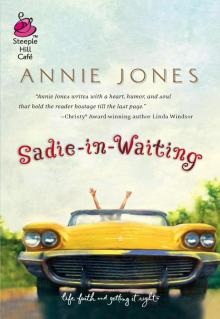 Sadie-in-Waiting
Sadie-in-Waiting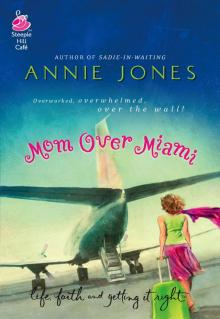 Mom Over Miami
Mom Over Miami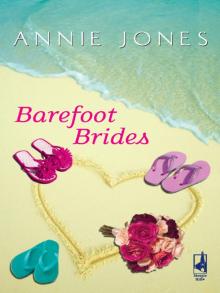 Barefoot Brides
Barefoot Brides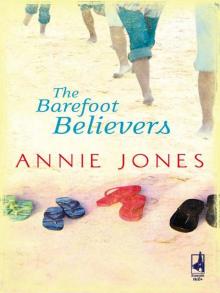 The Barefoot Believers
The Barefoot Believers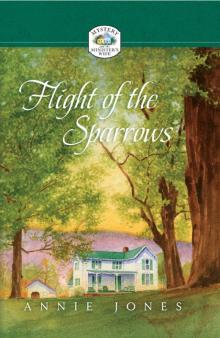 Flight of the Sparrows
Flight of the Sparrows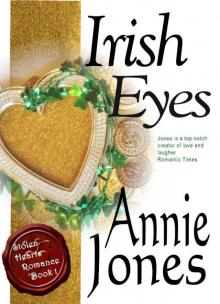 Irish Eyes (Stolen Hearts Romance)
Irish Eyes (Stolen Hearts Romance)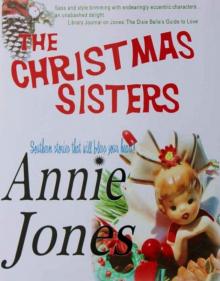 The Christmas Sisters
The Christmas Sisters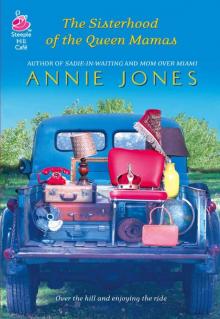 The Sisterhood of the Queen Mamas
The Sisterhood of the Queen Mamas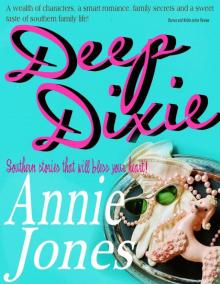 Deep Dixie
Deep Dixie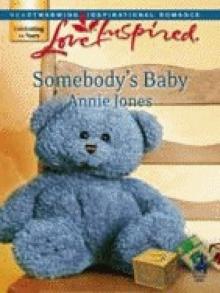 Somebody's Baby
Somebody's Baby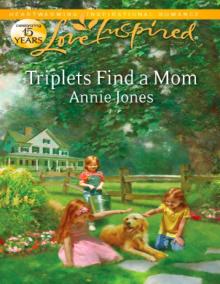 Triplets Find a Mom
Triplets Find a Mom Blessings of the Season
Blessings of the Season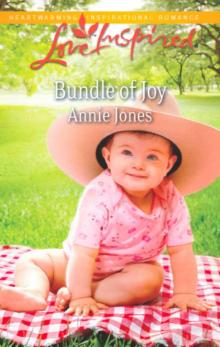 Bundle of Joy
Bundle of Joy Their First Noel
Their First Noel